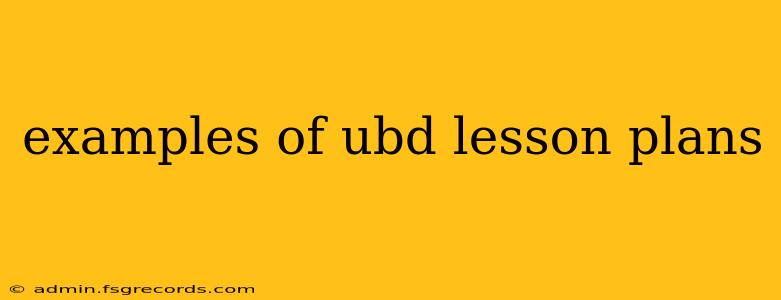Understanding by Design (UBD) is a framework for creating effective lesson plans that prioritize student understanding and achievement of specific learning goals. Instead of starting with activities, UBD starts with the desired results, working backward to plan assessments and learning experiences. This approach ensures alignment between what students learn, how they demonstrate their learning, and the overall educational objectives.
This post provides examples of UBD lesson plans across different subjects and grade levels, illustrating the key components of the framework. Remember, these are examples—adapt them to your specific context, student needs, and available resources.
Example 1: 5th Grade Science - Understanding Ecosystems
Stage 1: Desired Results
- What students will know: Students will understand the interconnectedness of organisms within an ecosystem and the roles different organisms play (producers, consumers, decomposers). They will be able to identify biotic and abiotic factors.
- What students will be able to do: Students will create a model ecosystem illustrating the relationships between organisms and their environment. They will be able to explain the impact of changes to one component on the entire ecosystem.
- Enduring Understandings: Ecosystems are complex and interconnected systems. Changes in one part of an ecosystem can have cascading effects. The survival of organisms depends on their ability to interact with their environment.
Stage 2: Assessment Evidence
- Performance Task: Students will design and build a miniature ecosystem in a terrarium, including a variety of plants and animals (real or simulated) representing different trophic levels. They will present their ecosystem and explain the relationships between organisms, labeling biotic and abiotic components.
- Other Evidence: Observations of student participation in class discussions, completion of a pre-assessment identifying prior knowledge about ecosystems, and a short quiz assessing understanding of key vocabulary.
Stage 3: Learning Plan
- Activities: Research on different types of ecosystems, group work to brainstorm ecosystem components, hands-on terrarium construction, class discussions analyzing ecosystem interactions.
- Differentiation: Provide various levels of support for building the terrariums, allow students to choose their ecosystem type, offer different research options based on reading levels.
- Technology Integration: Use online resources to research ecosystems, create presentations using multimedia tools.
Example 2: 9th Grade English Language Arts - Analyzing Shakespeare's Hamlet
Stage 1: Desired Results
- What students will know: Students will understand the major themes in Hamlet (e.g., revenge, morality, madness). They will be able to identify key literary devices used by Shakespeare.
- What students will be able to do: Students will analyze selected scenes from Hamlet, writing an essay that argues a specific interpretation of a key theme.
- Enduring Understandings: Literature reflects the cultural and historical context in which it was created. Effective analysis involves close reading and attention to detail. Ambiguity and multiple interpretations are inherent in great works of literature.
Stage 2: Assessment Evidence
- Performance Task: A well-supported essay arguing a specific interpretation of a central theme in Hamlet, using textual evidence to support claims.
- Other Evidence: Class participation in discussions, short quizzes on plot points and characters, annotations of selected scenes.
Stage 3: Learning Plan
- Activities: Close reading of selected scenes, class discussions exploring themes and interpretations, research on Shakespearean language and dramatic conventions, writing workshops focusing on essay structure and argumentation.
- Differentiation: Provide graphic organizers and outlines for essay writing, offer peer feedback opportunities, provide access to various resources such as audiobooks or simplified texts.
- Technology Integration: Use online Shakespeare resources, access digital copies of the play, utilize collaborative writing tools.
Example 3: 12th Grade History - The Cold War
Stage 1: Desired Results
- What students will know: Students will understand the major events, key players, and ideological conflicts of the Cold War. They will be able to analyze the impact of the Cold War on global politics.
- What students will be able to do: Students will create a multimedia presentation that analyzes a specific Cold War event, considering multiple perspectives and its long-term consequences.
- Enduring Understandings: Historical events are shaped by complex interactions of political, economic, and social factors. Understanding different perspectives is crucial for interpreting historical events. The past has significant implications for the present.
Stage 2: Assessment Evidence
- Performance Task: A multimedia presentation analyzing a specific Cold War event, demonstrating understanding of diverse viewpoints and long-term consequences.
- Other Evidence: Participation in debates and discussions, completion of research projects, a final exam covering key concepts.
Stage 3: Learning Plan
- Activities: Lectures, primary source analysis, group research projects, debates, multimedia presentation creation.
- Differentiation: Offer various research topics based on student interests, provide scaffolding for research and presentation creation, offer different presentation formats.
- Technology Integration: Use online resources to research, create multimedia presentations using various software tools.
These examples demonstrate how UBD can be applied across different subjects and grade levels. Remember to always start with the desired results, carefully plan your assessments, and design engaging and effective learning experiences. By focusing on understanding, you can create lessons that truly empower students to learn and achieve.

